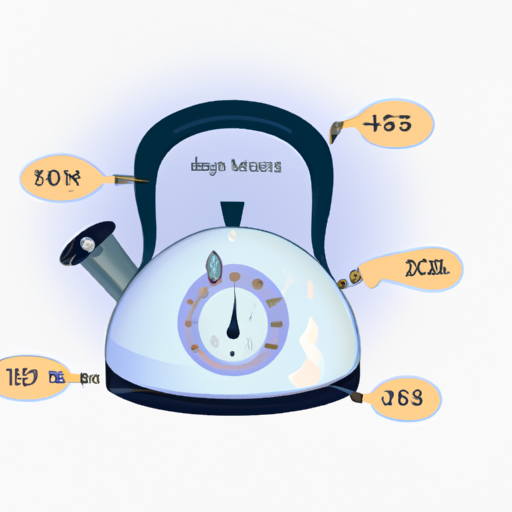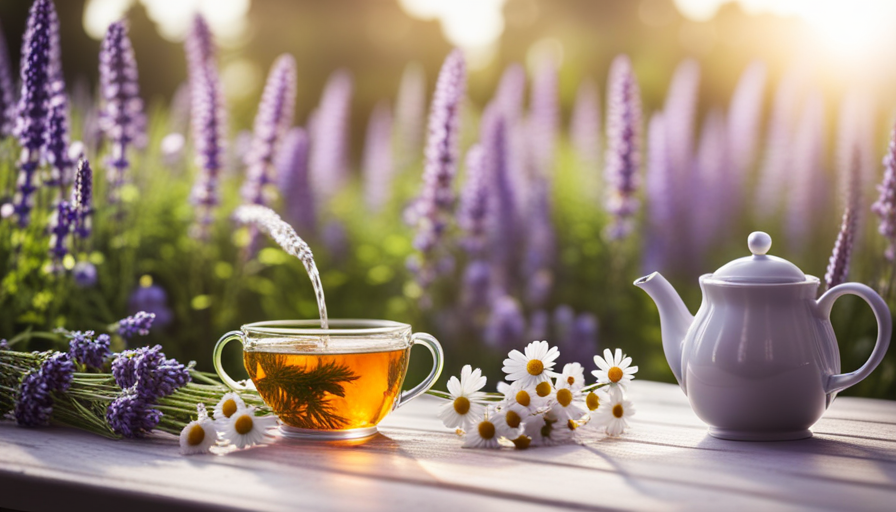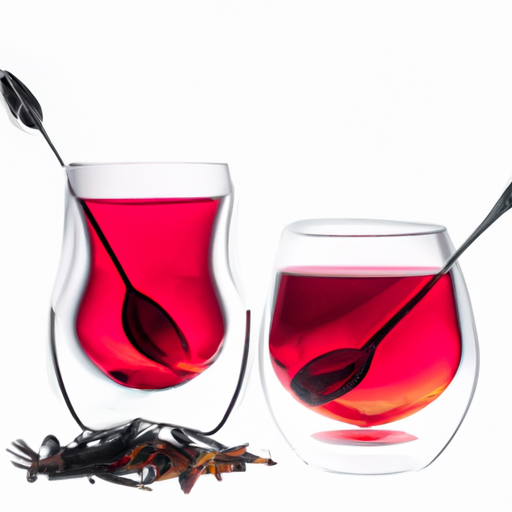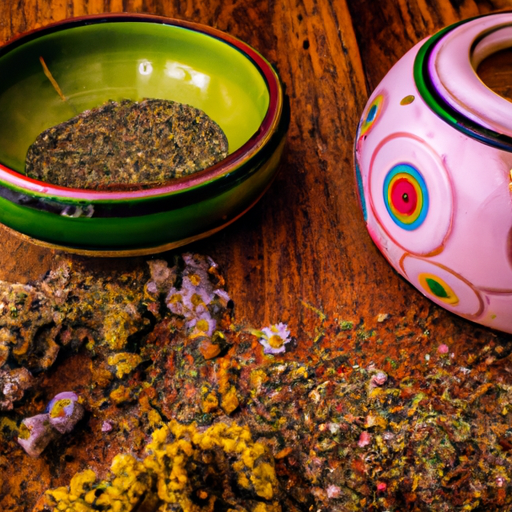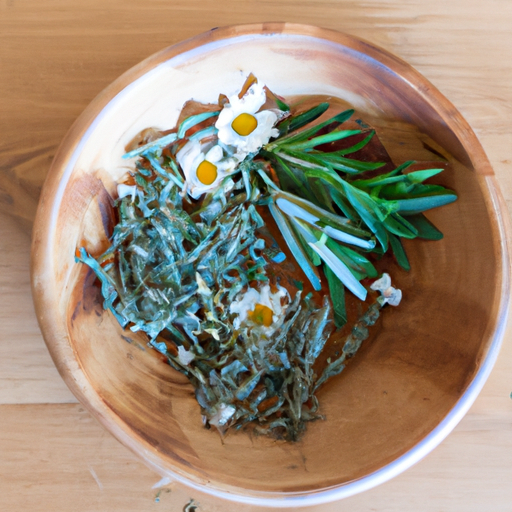Have you ever found yourself standing in the tea aisle, staring at rows upon rows of colorful boxes and wondering, ‘How can I tell if this tea is herbal?’ It’s like being lost in a beautiful labyrinth, searching for the secret garden of all-natural goodness. Well, fear not, dear tea enthusiasts, for I am here to guide you through this maze and help you uncover the hidden treasures of herbal teas.
In this article, I will share with you my knowledge and expertise on how to distinguish herbal teas from their caffeinated counterparts. We will embark on a journey of discovery, exploring label reading, key ingredients, caffeine content, aroma, taste, brewing methods, and the reputation of tea brands.
By the end of this adventure, you will be equipped with the tools to confidently identify and savor the delightful world of herbal teas.
So, grab your favorite mug, relax, and let’s embark on this aromatic expedition together. The secret garden of herbal teas awaits, and it’s time to unlock its enchanting flavors and health benefits.
Key Takeaways
- Herbal teas are made from dried flowers, seeds, fruits, and herbs, not from the Camellia sinensis plant.
- Herbal teas are caffeine-free alternatives to traditional teas.
- Herbal teas offer various health benefits, such as relaxation and improved digestion.
- Brewing temperature and steeping time vary for different herbal teas.
Read the Label
You can easily identify if a tea is herbal by reading the label, which will clearly state the ingredients and indicate if it’s made purely from herbs and botanicals.
Understanding tea varieties is essential when looking for herbal teas. Unlike black or green tea, herbal teas aren’t made from the leaves of the Camellia sinensis plant. Instead, they’re created using a variety of dried flowers, seeds, fruits, and herbs. This allows for a wide range of flavors to explore, from soothing chamomile to invigorating peppermint.
The label will provide you with the necessary information to make an informed choice. Look for key ingredients such as lavender, hibiscus, or lemongrass, as these are common in herbal teas. With this knowledge in mind, you can confidently select the perfect herbal tea for your enjoyment.
Look for Key Ingredients
When identifying whether a tea is herbal, it’s important to pay attention to the key ingredients present. Here are three key ingredients to look for when determining if a tea is herbal:
-
Chamomile: This popular herb is known for its calming properties and is often used to promote relaxation and help with sleep.
-
Peppermint: With its refreshing and cooling taste, peppermint is commonly used in herbal teas to aid digestion and soothe stomach discomfort.
-
Rooibos: This caffeine-free herb from South Africa is rich in antioxidants and has been linked to various health benefits, including improved heart health and better digestion.
Drinking herbal tea has numerous benefits, such as providing hydration, promoting relaxation, and supporting overall well-being.
Now, let’s move on to the next section and check for the caffeine content in teas.
Check for Caffeine Content
Now let’s find out how much caffeine is in these delightful brews! When trying to determine if a tea is herbal, checking the caffeine content is crucial. Herbal teas are typically caffeine-free alternatives to traditional teas, making them a popular choice for those looking to limit their caffeine intake. To help you make an informed decision, here’s a table that showcases the caffeine content of common herbal teas:
| Herbal Tea | Caffeine Content |
|---|---|
| Chamomile | 0 mg |
| Peppermint | 0 mg |
| Rooibos | 0 mg |
| Hibiscus | 0 mg |
By opting for these caffeine-free alternatives, you can still enjoy the health benefits that come with tea, such as antioxidants and soothing properties. Now, let’s move on to the next section and explore how to notice the aroma and taste of herbal teas.
Notice the Aroma and Taste
Explore the delightful aromas and flavors of herbal teas to truly immerse yourself in a sensory experience like no other. When identifying herbal tea, one of the key factors to consider is the distinct aroma and taste. Unlike traditional teas, herbal teas are made from a variety of plants, flowers, and herbs, resulting in unique flavors and scents.
From the soothing, floral notes of chamomile to the invigorating, minty taste of peppermint, each herbal tea offers its own delightful profile. Not only do these teas provide a pleasurable drinking experience, but they also come with numerous health benefits. Many herbal teas are known for their calming properties, aiding in relaxation and sleep. Others are packed with antioxidants and can help boost the immune system.
As you savor the aromatic and flavorful qualities of herbal teas, consider the brewing method to ensure you fully enjoy their benefits.
Consider the Brewing Method
To fully appreciate the nuances of your chosen herbal infusion, consider the brewing method as it can be the secret ingredient that unlocks the tea’s hidden depths, much like a chef finely tuning a recipe to bring out the flavors in a dish.
-
Brewing Temperature: Different herbal teas require different brewing temperatures to bring out their optimal flavors. For delicate floral teas like chamomile or lavender, a lower temperature around 175°F (80°C) is ideal to preserve their delicate aromas. Stronger herbal blends like peppermint or ginger may benefit from a higher temperature of 200°F (95°C) to extract their bold flavors.
-
Steeping Time: Pay attention to the recommended steeping time for your herbal tea. Each tea has its own ideal steeping time to ensure the flavors are properly infused. Generally, herbal teas require longer steeping times compared to traditional teas. A range of 5-7 minutes is often recommended, but it’s always best to refer to the specific instructions for your chosen herbal infusion.
By understanding the importance of brewing temperature and steeping time, you can ensure that your herbal tea is brewed to perfection, allowing you to fully savor its unique characteristics.
Now, let’s delve into the next step of the process and research the brand or manufacturer to ensure the quality of your herbal tea.
Research the Brand or Manufacturer
Take a moment to dive into the world of the brand or manufacturer behind your chosen infusion, allowing their story and reputation to guide your selection. When determining if a tea is herbal, it’s important to research the brand or manufacturer to ensure the quality and authenticity of the product.
Start by checking customer reviews online to get an idea of other people’s experiences with the tea. Positive reviews can indicate a reliable brand that produces herbal teas.
Additionally, look for organic certification on the packaging or website. This certification ensures that the tea has been grown and processed without the use of synthetic pesticides or chemicals.
By researching the brand or manufacturer, you can make an informed decision about whether the tea you’ve chosen is truly herbal.
To further enhance your knowledge, consult an expert or tea specialist who can provide valuable insights and recommendations.
Consult an Expert or Tea Specialist
Get a fresh perspective on your tea selection by seeking advice from an experienced tea specialist who can spill the tea on the best options based on your taste preferences and desired effects.
When consulting an expert or tea specialist, you can gain valuable insights into the world of herbal teas. Here are three key areas they can help you with:
-
Benefits of herbal tea for health and wellness: A tea specialist can educate you on the various health benefits associated with different herbal teas. They can guide you towards teas that promote relaxation, aid digestion, boost immunity, or support weight loss.
-
Different types of herbal teas and their unique properties: With their extensive knowledge, tea specialists can introduce you to a wide range of herbal teas and their unique properties. They can explain the differences between chamomile, peppermint, lavender, and other popular herbal teas, helping you find the perfect match for your taste buds.
-
Customized tea recommendations: By understanding your preferences and needs, a tea specialist can recommend specific herbal teas that align with your desired effects. Whether you’re looking for a soothing bedtime tea or an energizing morning blend, they can provide personalized suggestions to enhance your tea-drinking experience.
Consulting an expert or tea specialist can be a game-changer when it comes to selecting the right herbal tea. Their expertise can help you explore the world of herbal teas, discover new flavors, and enjoy the numerous health benefits they offer.
Frequently Asked Questions
Can I determine if a tea is herbal by simply looking at the packaging design?
No, the color or shape of the tea bag does not indicate if it is herbal or not. To determine if a tea is herbal, look for ingredients like chamomile, peppermint, or hibiscus listed on the packaging.
Are there any specific visual cues on the tea bag itself that indicate whether it is herbal or not?
Tea bag appearance can provide visual cues about whether it’s herbal or not. Look for packaging that prominently displays "herbal" or lists specific herbs. Additionally, the tea bag itself may have images or text indicating it’s herbal.
Is it possible for a tea to be labeled as herbal but still contain caffeine?
Herbal tea can be labeled as such and still contain caffeine. While herbal teas are typically caffeine-free, certain plants like yerba mate or guayusa may be included, providing a natural source of energy.
Can the aroma and taste of a tea alone determine whether it is herbal or not?
A tea’s aroma and taste alone cannot determine if it is herbal. Visual cues, like the presence of tea leaves or flowers, can be more reliable indicators.
Is the brewing method different for herbal teas compared to other types of teas?
The steeping time for herbal teas is typically longer than for other types of teas. The type of water used can also affect the brewing process of herbal teas.
Conclusion
In conclusion, determining whether a tea is herbal or not requires careful attention to detail. By reading the label and looking for key ingredients, checking for caffeine content, noticing the aroma and taste, considering the brewing method, researching the brand or manufacturer, and consulting an expert or tea specialist, one can confidently identify herbal teas.
Remember, coincidence plays a significant role in this process. It’s fascinating how a simple coincidence in the ingredients or brewing method can reveal the true nature of a tea. So, pay attention to the details, and enjoy your herbal tea experience!


